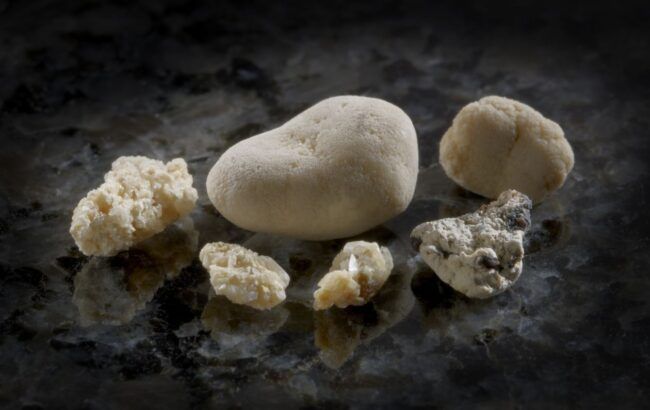
There is no doubt that for sick and healthy dogs alike, there is nothing better for them than a natural diet. Have you ever seen a nutritionist who offers the patient only processed foods as the basis for its diet? Never.
In addition to being cheaper, homemade diets are much healthier. It’s a matter of pure logic, don’t you think?
Another great advantage of homemade diets is their high water content (70%) compared to processed diets, like kibble, that contain only 10% water. This necessarily leads to water intake by the patient indirectly through the food.
I have nothing against kibble; on the contrary, I recommend that you use it, but only as a COMPLEMENT.
The higher the water consumption, the lower the probability of stone formation. Homemade diets have 70% water, kibble pellets… 10%
This type of patient develops these stones due to the presence of excess oxalate and calcium in the diet. Oxalate is a carbohydrate present in many foods. There are tables listing foods which are high and low in oxalate and calcium, so that you know what should and should not to give your dog, in addition to a specific diet.
The homemade diets that I provide to my clients are low in oxalate, with minimal levels of calcium as well as a normal level of phosphorus, which prevents the absorption of excess calcium.
There are many commercial prescription diets on the veterinary market such as Royal Canin and its Urinary S/O, Hills with s/d and c/d. The problem with these diets is that in addition to being expensive, dogs do not eat them.
I recommend them as a SUPPLEMENT in small amounts, but there is a huge difference between processed and natural diets. Ask a nutritionist for humans if he would dare to give a sick patient nothing more than a processed diet; they wouldn’t dream of it.
Oxalate stones can be difficult to eliminate and sometimes it is not possible to do so. I am content with slowing them down or stopping their growth. However, I have had several patients who have successfully eliminated them, and it is a great happiness for me.
NUTRIENTS
Water
As mentioned above, water is the key to the prevention of stone formation. The more aqueous the medium (the bladder) the less chance that the elements necessary for the formation of stones will concentrate.
Try to use water with the lowest possible mineral content, such as distilled water. This is especially important if you live in areas where tap water is hard and therefore high in minerals.
Homemade diets are high in water content, which is a great advantage because the patient ingests water indirectly through food.
Carbohydrates and commercial diets
Cereals are high in carbohydrates and many of them contain a lot of oxalates, which is not good for the patient with calcium oxalate stones.
Dogs fed commercial diets can be highly prone to developing stones due to the excess of grain, and thus carbohydrates, in their diet.
One of the main inquiries I get is about kidney stones, both calcium oxalate and struvite.
If you need a consultation concerning the nutrition of your dog with kidney stone problems, do not hesitate to contact me.
Click here and fill out the questionnaire so that we can start working together.
Best regards
